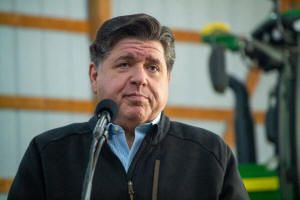Pritzker’s new budget report could set tone for conservative 2027
spending plan
[February 07, 2026]
By Jerry Nowicki and Ben Szalinski
With Gov. JB Pritzker’s annual budget address less than two weeks away,
a new report from his office is setting the table for a speech that’s
likely to be bleak in tone.
And it’s likely to serve as a warning to lawmakers and advocates that
the state doesn’t have room for new spending programs in the upcoming
2027 fiscal year.
The report’s message: Enacted or threatened federal funding cuts are
creating tremendous uncertainty, even in the current fiscal year.
“Unlike the federal government, all states, including Illinois, are
required to annually balance their budgets and have limited, if any,
options to fill gaps left by these federal reductions,” the report from
the Governor’s Office of Management and Budget stated.
The governor’s office also put direct dollar amounts on some of the
impending federal policy changes or cuts:
$100 million over two years to implement administrative changes related
to new Supplemental Nutrition Assistance Program and Medicaid
requirements.
$80 million annually as a result of the federal government shifting a
greater share of SNAP administrative costs.
$705 million in new benefits spending on SNAP if Illinois exceeds newly
created error rate caps.
$6.1 billion in cumulative lost revenue for Medicaid ($3.8 billion of
which is lost federal support) by fiscal year 2033, due to caps on
provider taxes. Impacts would be first felt in fiscal year 2028 and
would ramp up over the following years.
$1 billion in child care-related funding in fiscal year 2027 if the
courts allow the administration’s funding “freeze” to take effect. A
judge on Friday issued a preliminary injunction blocking the freeze from
taking immediate effect.

Decoupling, child care
The culprit for the known variables is largely H.R. 1, widely publicized
as the “One Big Beautiful Bill Act.” In October, the governor’s office
warned it could erase $830 million in tax revenue for the current fiscal
year. But state lawmakers acted to decouple the federal and state tax
code in certain areas their fall veto session, and the report now
expects that to reduce the current-year impact to about $587 million.
Pritzker also directed state agencies to hold back $482 million in
current-year spending last month.
The impact of tax code changes would be less in the upcoming fiscal year
because the largest current-year impact was due to the “acceleration of
certain tax benefits forward,” according to the report.
But as of Friday morning when the report was published, there was also a
major unknown variable: The Trump administration had threatened to
freeze $1 billion in child care-related funding to Illinois (and another
$9 billion to several other blue states.)
[to top of second column]
|

Gov. JB Pritzker takes questions from a reporter in October 2025.
(Capitol News Illinois photo by Jerry Nowicki)

Ostensibly, the administration said it was seeking to root out fraud —
without making specific allegations — although the affected states
argued the amount of paperwork required for the child care funds to be
released presented them with an intentionally “impossible” task.
A federal judge on Friday issued a preliminary injunction blocking the
freeze from taking effect as the full case plays out. Previously, the
courts had issued two two-week restraining orders, creating an added
level of uncertainty in the run-up to the budget address that Pritzker
is slated to deliver on Feb. 18.
Existing budget shortfalls
The report notably didn’t touch on fiscal pressures related to
structural shortfalls in ongoing revenue compared to expenditures in
Illinois’ budget.
GOMB’s October report pegged the FY27 deficit at $2.2 billion if
lawmakers didn’t make any changes to spending or taxing policies, noting
much of the deficit was driven by the state’s own policies but
exacerbated by federal changes.
The baseline projections show revenue is not expected to grow in FY27
without lawmakers finding a way to increase it. At the same time,
spending was on track to increase by about $1.9 billion from the current
fiscal year without changes.
Federal funding allotments are already showing signs of falling short in
FY26, according to the January report from the General Assembly’s
Commission on Government Forecasting and Accountability.
Federal payments to Illinois were down $169 million last month compared
to January 2025 — a decline of nearly 36%. While COGFA’s experts caution
that federal receipts are typically one of the state’s most volatile
revenue sources because they arrive on an inconsistent schedule, January
marked the third straight month of decline.
Federal receipts are now down $202 million, or 8%, so far this fiscal
year.
“The FY 2026 budget assumed a notable rise in Federal Sources this
fiscal year, so significant improvement is needed over the remaining
five months to reach initial budget expectations for this category of
revenues,” the report said.
Despite indications the federal government is sending less money to the
state, other sources such as income and sales taxes continue to
increase, and revenue is up 3.5% so far in FY26.
Capitol News Illinois is
a nonprofit, nonpartisan news service that distributes state government
coverage to hundreds of news outlets statewide. It is funded primarily
by the Illinois Press Foundation and the Robert R. McCormick Foundation. |